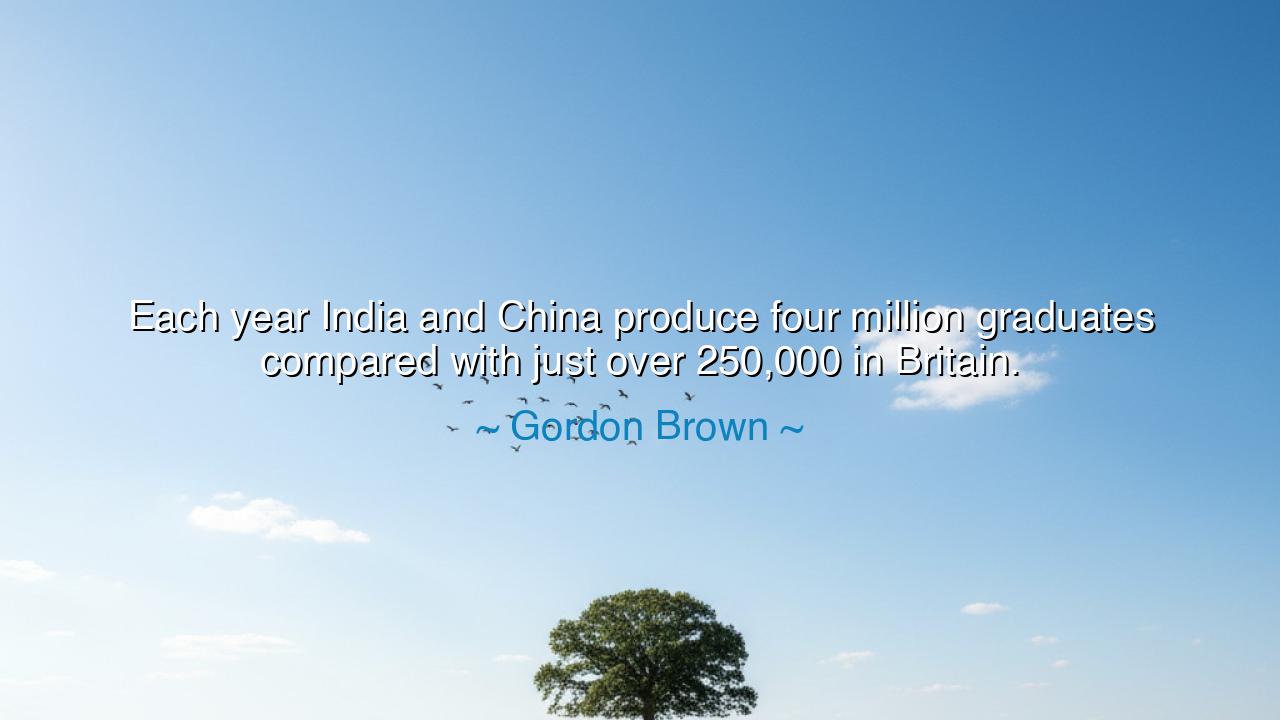
Each year India and China produce four million graduates compared
Each year India and China produce four million graduates compared with just over 250,000 in Britain.






The words of Gordon Brown — “Each year India and China produce four million graduates compared with just over 250,000 in Britain.” — resound not merely as a statistic, but as a warning and a call to awakening. Beneath the surface of numbers lies a deeper truth about the shifting tides of human progress — about the rise of new civilizations, the movement of talent and ambition, and the destiny of nations shaped by their devotion to education. Brown, speaking as both statesman and steward of the future, sought to remind his people that greatness is not inherited by birthright, but earned through knowledge, discipline, and collective will. His words, though uttered in the language of economics, echo with the ancient rhythm of history — the truth that the civilizations which honor learning shall ascend, and those that neglect it shall fade into shadow.
When Gordon Brown, former Prime Minister of the United Kingdom, delivered this reflection, he spoke at a moment when the world was entering a new age — the dawn of the global knowledge economy. The power once measured by armies and empires had shifted to the realm of the mind. The factories of the industrial past were giving way to the laboratories, universities, and innovation hubs of the modern age. And in the East — in India and China — the sleeping giants had awakened. With each passing year, millions of young scholars stepped forth from their schools and universities, armed not with swords, but with science, skill, and vision. Their number was not merely a testament to population, but to purpose — the collective decision of two ancient civilizations to reclaim their place in the world through the pursuit of knowledge.
By contrast, Brown’s lament for Britain’s 250,000 graduates was not a rebuke, but a reminder — that the strength of a nation rests not in its history alone, but in the education of its youth. In ages past, Britain had been a fountain of learning, producing thinkers like Newton, Darwin, and Shakespeare, whose ideas shaped the modern world. Yet now, in the face of rapid change, complacency had dulled the edge of ambition. Brown’s warning was the voice of a leader who saw the approaching horizon — the rise of a new world where knowledge, not empire, would determine destiny. His words were meant to stir the spirit of renewal, to rekindle the ancient fire of curiosity that had once driven explorers across oceans and inventors into the unknown.
The story of such transformation is not new to history. In the Renaissance, Europe rose from centuries of darkness through its rediscovery of learning. Cities like Florence and Venice became beacons of art and science because their people invested in education, in the awakening of the mind. Likewise, in the Golden Age of India, scholars in Nalanda and Taxila studied medicine, astronomy, and philosophy, drawing students from distant lands. In China’s Tang Dynasty, the civil service exams transformed the empire by elevating scholars over aristocrats, proving that merit and learning could govern better than birthright. Each of these epochs teaches the same lesson: that the power of a nation flows not from its wealth or weapons, but from the wisdom of its people.
In Brown’s quote, then, lies both reverence for and anxiety about the turning of the world’s wheel. The East, once regarded by the West as a distant pupil, had now become its rival, even its teacher. The balance of knowledge was shifting back toward the lands of ancient sages and mathematicians, where learning had always been sacred. Brown’s concern was not envy, but urgency — a plea for his own people to remember that education is not a luxury, but the lifeblood of civilization. For every generation that neglects learning writes its own decline, while every generation that cultivates it builds a foundation for eternity.
And yet, these numbers — four million, two hundred fifty thousand — are not mere measures of competition. They are symbols of a greater truth: that human potential is not confined to any one land. Each mind that learns, whether in Delhi or Beijing or London, contributes to the collective ascent of humanity. The task, then, is not only to match the quantity of graduates, but to deepen the quality of wisdom, to teach not only how to work, but how to think, how to question, how to dream. For the true purpose of education is not the accumulation of degrees, but the cultivation of character and imagination — the forging of souls capable of shaping a better world.
So let this be the teaching, O seeker of understanding: invest in the mind, for it is the engine of destiny. A nation that honors its teachers, that lifts its children from ignorance into wonder, shall never truly fall. Let us not fear the rise of others, but let their example awaken our own resolve. For the world is vast enough for many lights to shine, and the pursuit of knowledge is the one race in which all may win together.
In the end, Gordon Brown’s words remind us of an eternal law: that civilization survives only through renewal — and renewal begins in the classroom. The torch of learning must be passed unbroken from generation to generation, lest it flicker and fade. And as India and China have shown, when a people turn their gaze toward education, they rise not only in power, but in purpose. For knowledge, rightly used, is not the property of nations — it is the heritage of humankind, and through it, the future is born anew.






AAdministratorAdministrator
Welcome, honored guests. Please leave a comment, we will respond soon